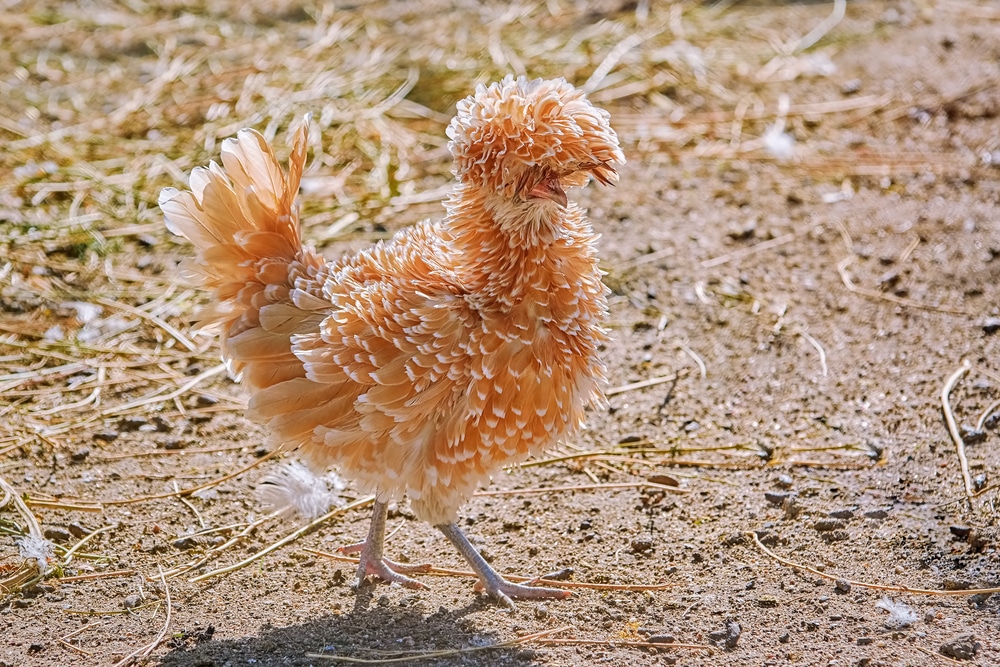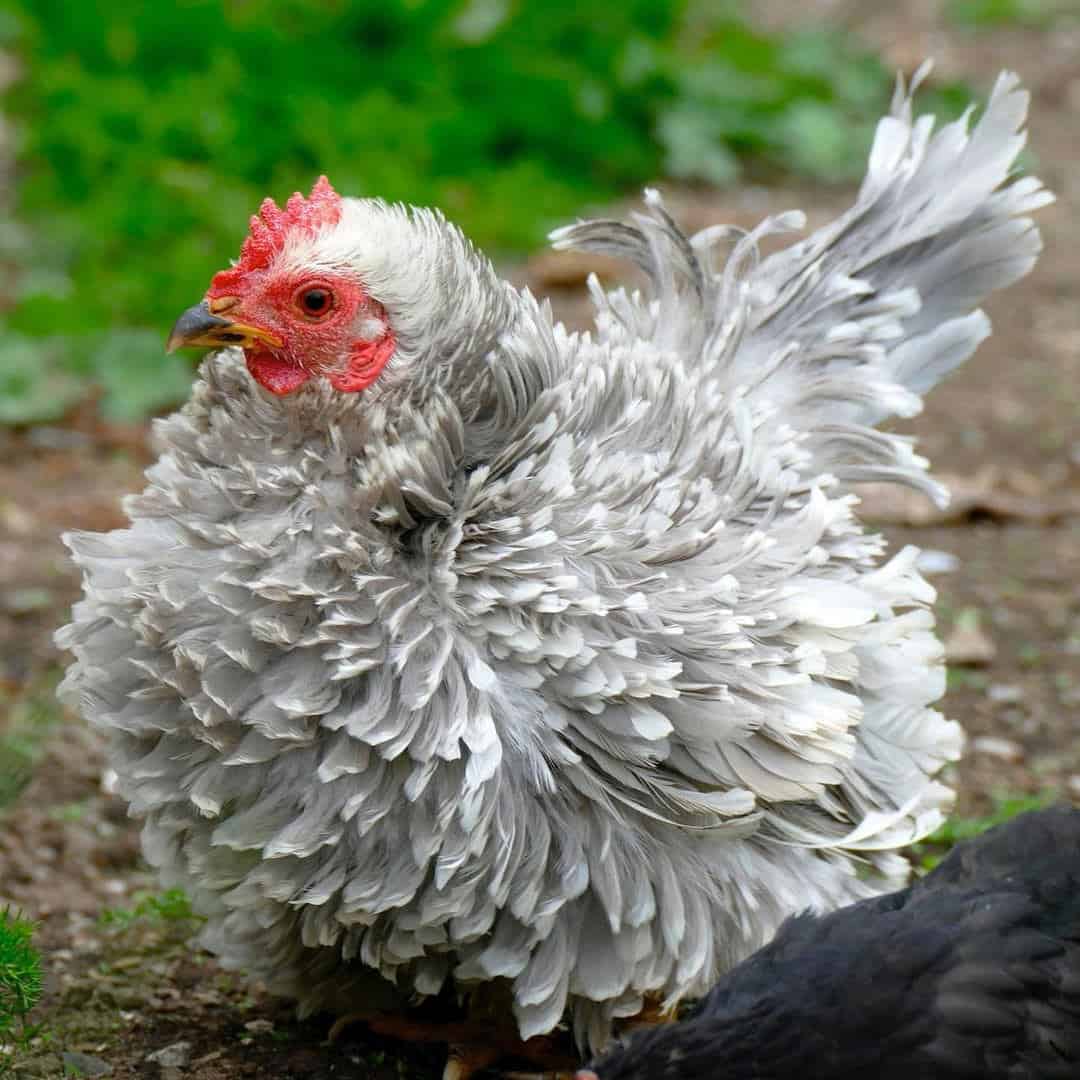Frizzle Chickens: The Fluffy, Feathered Stars Of The Poultry World
So, let's talk about frizzle chickens. Yeah, you heard me right—frizzle chickens. These little fluffballs are not your ordinary chickens, folks. Imagine walking into your backyard and seeing a bird that looks like it just rolled out of bed after an epic windstorm. That's what we're dealing with here. Frizzle chickens are basically the Kardashians of the poultry world—eye-catching, unique, and definitely conversation starters. If you're a chicken enthusiast or even just someone who appreciates quirky pets, this is the breed for you.
But why all the fuss about frizzles, you ask? Well, it's not every day you come across a bird that looks like it's auditioning for a role in a fairy tale. Their feathers curl outward in a whimsical way, giving them a playful and almost cartoonish appearance. And let's be real—anything that looks this cute automatically gets bonus points in the pet world. But there's more to these chickens than just their looks, and that's exactly what we're going to dive into today.
So, buckle up, because we're about to take you on a journey through the world of frizzle chickens. From their history and origins to how to care for them, we'll cover it all. And hey, who knows? By the end of this, you might just find yourself thinking about adding one of these fluffy darlings to your flock. Let's get started, shall we?
Read also:Bronson Pinchot Says Hersquoll Never Forget What His Idol Lucille Ball Told Him Lsquoi Still Cry Thinking About Itrsquo Exclusive
Table of Contents
Introduction: Why Frizzle Chickens Are All the Hype
A Brief History of Frizzle Chickens
Physical Characteristics of Frizzle Chickens
Behavioral Traits of Frizzle Chickens
Caring for Your Frizzle Chicken
Health Considerations for Frizzle Chickens
Read also:Atleacutetico Nacional Medelliacuten The Heartbeat Of Colombian Football
Breeding Frizzle Chickens: Tips and Tricks
The Perfect Diet for Frizzle Chickens
Why Frizzle Chickens Are Gaining Popularity
Conclusion: Are Frizzle Chickens Right for You?
A Brief History of Frizzle Chickens
Frizzle chickens have been around for centuries, and their origins are as fascinating as their appearance. While the exact timeline of their development is a bit hazy, historians believe that frizzles first appeared in Asia, possibly in regions like Malaysia or China. The term "frizzle" itself refers to the unique curl of their feathers, which is caused by a genetic mutation. This mutation has been selectively bred over time to produce the stunning, fluffy birds we see today.
In the 1800s, frizzle chickens made their way to Europe, where they quickly became a favorite among poultry enthusiasts. By the early 20th century, they had gained enough popularity to be included in poultry shows and exhibitions. Today, frizzles are recognized by poultry associations worldwide, though they are still considered a rare breed in many countries. Their quirky charm and distinctive appearance continue to captivate poultry lovers everywhere.
Physical Characteristics of Frizzle Chickens
Let's talk about what makes frizzle chickens stand out in the flock. First and foremost, there's the frizzled feathering. These feathers curl outward instead of lying flat against the body, giving the bird a puffy, almost fluffy appearance. Imagine a chicken that looks like it's wearing a permanent perm, and you've got the idea. This unique trait is caused by a dominant gene, meaning that if one parent has the frizzle gene, there's a good chance their offspring will inherit it too.
Frizzle chickens come in a variety of colors and patterns, from classic black and white to more exotic shades like blue, buff, and cuckoo. Their size can vary depending on the breed they're mixed with, but generally, frizzles are medium-sized birds. They have a sturdy build and are well-suited for both hot and cold climates, thanks to their dense feathering. And let's not forget those adorable feathered legs—another trait that adds to their charm.
Behavioral Traits of Frizzle Chickens
When it comes to personality, frizzle chickens are as delightful as they are distinctive. They're known for being friendly, curious, and easygoing, making them a great choice for families or first-time chicken owners. Most frizzles love human interaction and aren't afraid to strut right up to you for some attention. They're also relatively quiet compared to other breeds, which is a plus if you live in a neighborhood with noise-sensitive neighbors.
One thing to keep in mind, though, is that frizzles can be a bit clumsy due to their fluffy feathers. Their vision might be slightly impaired by all that fluff, so they might need a little extra help navigating their environment. Despite this, they're still active birds that enjoy foraging and exploring their surroundings. Overall, frizzle chickens are a joy to have around and bring a lot of personality to any flock.
Caring for Your Frizzle Chicken
Taking care of a frizzle chicken isn't too different from caring for any other chicken, but there are a few things to keep in mind. First, their frizzled feathers require a bit more maintenance. Regular grooming is essential to keep their feathers looking their best and to prevent matting. You'll also want to make sure they have access to a clean and dry coop, as wet feathers can lead to health issues.
Feeding your frizzle chicken a balanced diet is crucial for maintaining their health and feather quality. A good-quality chicken feed supplemented with fresh fruits and vegetables will keep them happy and healthy. And don't forget fresh water—chickens need plenty of it to stay hydrated, especially in hot weather. Lastly, providing them with a safe and secure outdoor space to roam is important for their physical and mental well-being.
Health Considerations for Frizzle Chickens
While frizzle chickens are generally healthy birds, there are a few health concerns to be aware of. Their unique feathering can make them more susceptible to certain conditions, such as feather mites and lice. Regular inspections and treatments can help keep these pests at bay. Additionally, their dense feathers can trap moisture, leading to issues like bumblefoot or frostbite in extreme cold weather.
Another thing to watch out for is feather picking. Frizzle chickens might be more prone to this behavior due to their fluffy appearance, so it's important to keep an eye on their interactions with other birds. If you notice any signs of feather picking, separating the affected bird and addressing the underlying cause can help prevent further damage.
Breeding Frizzle Chickens: Tips and Tricks
If you're thinking about breeding frizzle chickens, there are a few things you should know. First, the frizzle gene is dominant, meaning that only one parent needs to have it to produce frizzled offspring. However, breeding two frizzle chickens together can result in what's called a "double frizzle," which can lead to health issues. To avoid this, it's best to breed a frizzle chicken with a non-frizzle chicken.
When selecting breeding pairs, look for birds with good conformation, vibrant feathering, and a friendly temperament. A healthy diet and proper care during the breeding process will increase the chances of producing strong, healthy chicks. And remember, patience is key—breeding frizzle chickens can be a bit of a challenge, but the rewards are definitely worth it.
The Perfect Diet for Frizzle Chickens
A well-balanced diet is essential for keeping your frizzle chicken happy and healthy. Start with a good-quality chicken feed that's specifically formulated for their age and stage of life. For example, growing chicks will need a higher protein diet than adult birds. Supplement their feed with fresh fruits and vegetables, but be mindful of portion sizes to prevent obesity.
Calcium is especially important for laying hens, so make sure they have access to crushed oyster shells or another calcium source. And don't forget about grit—chickens need it to help them digest their food properly. Lastly, always provide fresh water and change it regularly to ensure it stays clean and free of contaminants.
Why Frizzle Chickens Are Gaining Popularity
Frizzle chickens are becoming increasingly popular among poultry enthusiasts, and it's not hard to see why. Their unique appearance and friendly demeanor make them a standout choice for both hobbyists and experienced chicken keepers. In recent years, social media platforms like Instagram and TikTok have played a big role in showcasing these quirky birds, further fueling their rise in popularity.
Plus, with more people turning to backyard farming and sustainable living, frizzle chickens offer a fun and rewarding way to get involved. They're not only great pets but also productive egg-layers, making them a practical choice for those looking to add value to their homestead. As more people discover the joys of keeping frizzle chickens, their popularity is sure to continue growing.
FAQ About Frizzle Chickens
Q: Are frizzle chickens good egg layers?
A: Yes, frizzle chickens can be good egg layers, depending on the breed they're mixed with. On average, they lay around 150-200 eggs per year.
Q: Can frizzle chickens fly?
A: Due to their dense feathering, frizzle chickens aren't great flyers. However, they can still hop and flutter short distances, so it's a good idea to keep them in a secure area.
Q: Do frizzle chickens need special grooming?
A: Yes, their frizzled feathers require regular grooming to prevent matting and keep them looking their best. Brushing them gently with a soft brush can help maintain their fluffiness.
Conclusion: Are Frizzle Chickens Right for You?
Frizzle chickens are more than just a pretty face—they're delightful, quirky, and full of personality. Whether you're a seasoned chicken keeper or a first-timer, these fluffy darlings have something to offer everyone. From their unique appearance to their friendly nature, frizzle chickens are sure to bring joy and laughter to your backyard.
So, if you're ready to take the plunge and welcome a frizzle chicken into your life, remember to provide them with proper care, a balanced diet, and plenty of love. And hey, who knows? You might just find yourself falling head over heels for these feathery friends. So, what are you waiting for? Go ahead and give a frizzle chicken a chance—they're worth it, trust me.
Got questions or comments? Drop them below, and let's keep the conversation going. Happy chicken keeping, y'all!
Article Recommendations


